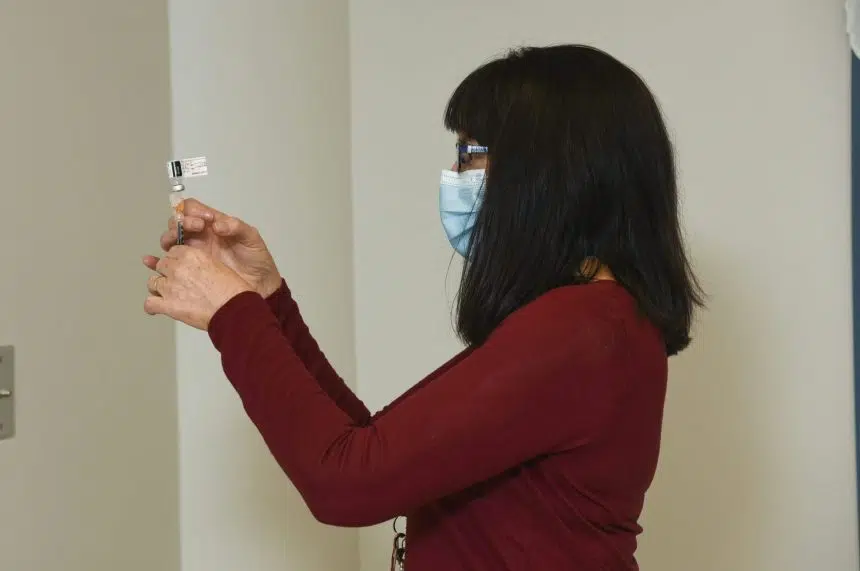The Saskatchewan government is defending its vaccination program as criticism surfaces that the rollout has been too slow.
Looking at the full number of 13,675 vaccines received by the provincial government up to Wednesday, only 4,524 doses have been administered, which is about 33 per cent. That total does not include 3,900 doses of the Pfizer vaccine received in Prince Albert on Wednesday.
Health Minister Paul Merriman said the government is moving as fast as it can on vaccinations.
“We are getting the vaccine into people’s arms as quickly, safely and effectively as possible,” Merriman said during a media conference Wednesday.
Merriman said of the 8,775 doses of the Pfizer vaccine received for the pilot project in Regina and Saskatoon, the provincial government was required to hold back half of the shipments to save as second doses. He said health officials didn’t have a set delivery schedule for doses at the time.
Both the Pfizer and Moderna vaccines require two doses, given three or four weeks apart, to reach their peak effectiveness against the virus.
Now and in the future, Merriman said, the province won’t be holding back any more doses, as there is now a vaccine delivery schedule in place, and in an effort to get more people vaccinated.
Regina initially received 3,900 doses of the Pfizer vaccine, from which 2,069 first doses (or 106 per cent) were administered. Merriman said administrators were able to get more doses out of the vials.
Participants in the pilot project were to start receiving their second shots Wednesday.
There were 4,875 doses sent to Saskatoon; from that total, 2,407 first doses (out of 2,437, or 98 per cent) had been given as of Wednesday. The second set of vaccinations is to start next Monday.
The 4,900 Moderna vaccine doses that arrived in Saskatchewan on Dec. 28 are all being used as first doses to vaccinate people in the north, but it’s moving relatively slowly. Merriman said there are challenges around transportation, organization and administering the vaccines as populations in the north are small and spread out.
“It’s not as if there’s a lineup at the General Hospital here in Regina of 1,000 people ready to get (the vaccine),” he said. “We’re doing this sequence very prioritized on what we see as the most challenging areas (and those where) we’re seeing the most fatalities.”
Of the 4,900 doses sent north, 710 were sent to the far north-central region, 1,370 went to the far northwest zone, 1,450 were distributed to the far northeast region and 1,370 were sent to the northeast area.
Health-care workers, long-term care residents and staff, and residents 80 years of age and over were given the first priority.
Another 5,300 doses of the Moderna vaccine are expected in the province next Monday, but the locations that are to get shipments are still being determined.
Merriman also blamed lower vaccination numbers on the federal government.
“We could get more vaccinations done more quickly if and when the federal government provides us with more doses,” said Merriman. “As of right now the feds are telling us to expect … a total of 30,000 doses expected in January. This is simply not near enough, and it is significantly less than they promised us just last month.”
Merriman said the original promise was 11,000 a week.
“We continue to raise our concerns about the slow pace of vaccine delivery at the official and ministry level,” he said.
The province’s new strategy begins with the 3,900 doses of the Pfizer vaccine that arrived in Prince Albert on Wednesday. Those vaccinations will be given to health-care workers and residents and staff of long-term and personal care homes in that area.
The government said 6,825 doses of the Pfizer vaccine are expected in each of the next three weeks — Monday (to go to Saskatoon and area), Jan. 18 (for Regina and area) and Jan. 25 (for North Battleford and surrounding region).
To prepare for that latter shipment, an ultra-low-temperature freezer is being moved from the University of Regina to North Battleford.







